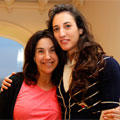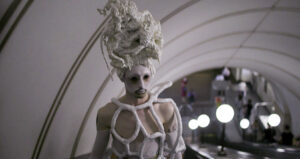Deniz Gamze Erguven, 2012 !F Sundance Fellow
Paris, France — Throughout the years, everything I had heard about the Sundance Labs had been completely appealing. I had viewed them from a distance with great interest and curiosity. The closer encounter happened through !F, (the Istanbul International Film Festival) early this year. The feature film script I am developing had been selected along with three other projects from Turkish directors. We were to be gathered for a shortened version of the Screenwriter’s Lab in Istanbul during the !F 2012 festival.
I have never lived in Istanbul, but my path has been drawn there often for the last twenty years. For the last decade, the city has been going through a literal rebirth. And as a frequent visitor, I have viewed this transformation as big steps forward. You quickly get a sense of a very lively and powerful youth culture, the re-appropriation of the cultural heritage and fulgurant developments in arts, industry… as well as a fair amount of chaos that comes along this much movement.
There is also a real momentum in terms of cinema, but this growing interest for films has not yet been matched by a willingness to encourage and support filmmaking. In this context, the alliance of !F and Sundance becomes all the more interesting.
The intention of such Labs is clearly to create a haven around developing films. With a few opening words, Alesia Weston, Associate Director of Sundance Institute’s Feature Film Internaional Program, shuts the doors from the inside on a safe creative space. For the three days to come, advisors and fellows will meet with a single interest: the best, (boldest, freest) creative blooming of each film.
My first meeting was with Jeremy Pikser, a big gun of a scriptwriter, with an obvious drive for a very wild type of comedy. This was absolute luxury. Jeremy greeted me at the entrance of a hundred-twenty-year-old giant bank building recently reopened as a contemporary art space called Salt. We shook hands and immediately raced to our table. And before we were seated, we had our hands in the engine together.
The draft at hand is getting close to a shooting script, but some passages still need some work and fine tuning. We go through them, bouncing on each other’s ideas. Simple, perfect adjustments pop out. The work session is lively and rewarding. I get a sense of rareness and urgency that makes me speak as fast as I can. We then discuss the backstories of the five main characters. Two still have secrets to be revealed. We go on talking at length about the script. Then Jeremy starts this very personal and brilliant reading of it: “See, your film is about transgression, that’s your backbone” He then goes on with a demonstration of how all the different parts are articulated around that. Jeremy is putting the lights on a work I have done mostly in the dark, instinctively. It feels like I’m shown the X-ray of my own script. This kind of conceptualization strengthens your work not only through the writing process, but through the shooting to the finishing…. This is a real gift he’s giving me.
It took a few emissaries calling the end of our meeting for us to actually leave that table. I felt ready to jump into a re-write, but Jeremy stopped me right there with a nonnegotiable rule: No writing throughout the Lab.
Scriptwriting is such a long distance race, that your first instinct is to sprint your way through it whenever you can. So learn to hold your horses, which is so essential at some moments of the process, is probably nothing I would do spontaneously. The pens-down/sit-down-and think constraint works as a valuable transmission of method (and a great guilt buster) for me.
The second meeting was with Athina Rachel Tsangari and I’m expecting a very different perspective on the script. Athina has a cinematographic language of her own, though you can sense through her cinema, the obsessive film watcher and hundreds of influences. She just brings in references as distant Monthy Python’s silly-walks and Antonioni’s Red Desert in the same shot. And Athina’s films are open doors to codes of other art forms, dance, video works… I introduce the project, then go through an assessment of all we have worked on with Jeremy. Athina takes over the discussion on structure where it was left, as if she was working the next shift. The discussions then jumps from philosophical levels to the most down to earth and trivial questions about how to make this film. As our meeting goes on, she puts on one hat after the other: writer, director and producer. It’s not only a great discussion. Again I also love the encounter.
Through the !F-Sundance program, Istanbul really feels like the crossroad it is. Our little community convened people with extremely complex cultural backgrounds. Many have moved from one country to another over their lives, are at home in many different cultures and speak numerous languages. Nobody’s French around the table, but the discussion spontaneously switches to French with Alesia, Athina and Reha, who for very different reasons speak that language perfectly. People probably meet on other levels. I often felt that for filmmakers, such gatherings as film festivals, labs…. give a sense that you’re meeting with people from your own specie. This is rare in every day life and it can be very reassuring at times. You share the same problematics, the same (chaotic) lives. And it’s wonderful to know that you’re not the only nutcase doing what you’re doing out there.
The !F-Sundance program included a panel discussion about the creative process for writers. Surprisingly enough, the discussion starts very openly on the dark sides of scriptwriting. Simply put, scriptwriting is tough, humbling. Even if you’re not a bit prone to depression, it can squeeze every ounce of happiness out of you and hurt you so much you’ll want to cry for your mama. It’s also a big gamble, so it shakes you. I discovered this through writing, but I would never discuss this publicly.
As I’m listening to this panel and hearing other scriptwriters speaking about their hardships while writing, of course I get a misery loves company kind of relief. But they’re giving an accurate account of the writing process and how completely strange it is. The audience is listening in rapt attention as everyone in the panel gives up their dirty secrets. If there’s anyone new to scriptwriting in the room, this is completely generous.
Then Alesia introduces the Sundance Institute Labs, detailing everything from the project submission to the work done in different Labs. Sally El Hosaini – who has freshly jumped out of the post-production on her first film, My brother the devil, and into a whirlwind of festivals – recounts her personal journey with her film, which was developed throughout the Sundance Labs.
Making a film — particularly a first feature film — is a long slog upstream. Programs like the !F-Sundance Lab, feel like a beautiful gift from the gods, helping you on your way. I deeply thank you for doing this.







